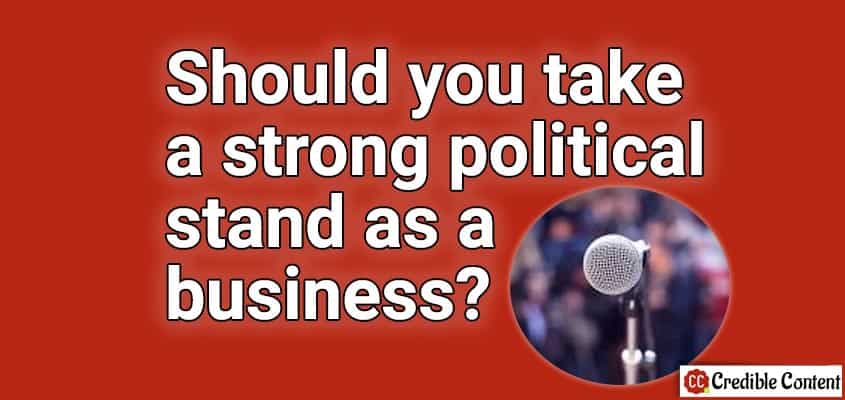If you go through different social media timelines of people from the USA, it is not just about politics (due to the impending presidential elections), it seems like the clash of the belief systems.
One of the people I have been following for more than a decade was exhorting other companies not to do business with the Republican party.
People in his timeline accused him of acting like a fascist and trying to curb democracy.
I remember even in the previous elections, famous investor Peter Thiel openly supported the candidacy of Donald Trump and earned the wrath of his “liberal peers”.
Anyway, they have published a podcast on the Content Marketing Institute titled Should your brand enter controversial conversations?
Although, in the podcast they don’t necessarily talk about political and ideological controversies and they’re mostly talking about taking a divergent stand from established norms, this brings to my mind, as a business, should you openly voice your political opinions and openly declare that you are not going to deal with people and businesses to display a contrarian bent of mind, politically and ideologically?
Here is a Twitter thread I recently posted:
Is it fair for businesses to take political and ideological stand? Businesses after all exist in this world. People who have businesses have political views as well as ideological views. So yes, they should take a stand. Some years ago, a client contacted me for work… 1/4
— Amrit from Credible Content (@ContentGyan) September 1, 2020
Depending on which side of the spectrum you stand, you will have your own opinion on who was being controversial – me, who had just expressed my opinion a couple of years ago and then moved on or the prospective client who insisted that he would only do business with me if I agreed with him.
I lost money and he lost a chance to work with a good content writer.
The point is, he took a stand and I took a stand. We wanted to conduct a business but because of our respective stands, we, or rather he, chose not to conduct it.
I often say that social media is the traditional “chaupal”.
In Indian villages, they used to have a “chaupal”, a place where people from the village would gather every evening to talk about various issues.
Through social media we have created global chaupals.
Since we don’t have to move from our chairs (or wherever we are sitting or standing) and we are not physically confronting the other person, we can be more reckless and direct compared to the real world.
For example, you can abuse a politician without running the risk of being roughed up by his or her security guards or even by his or her acolytes.
But the topic here is, should you, as a business, participate in controversial or politically and ideologically charged up topics?
I would suggest, use your judgement and evaluate how it is going to affect your business in the short-term and long-term.
Again, the main discussion of the above podcast is not about taking a loud stand on a political and ideological issue but expressing a counter opinion, for example, Google starting a new university-level course that aims to replace the conventional university courses that people have been doing for a couple of centuries.
Coming back to taking a strong stand on political and ideological issues.
If you think that it is worth taking the risk, go ahead.
Otherwise, focus on your business. Even within your business, there are thousands of issues you can deal with.
I will give you practical advice.
In the current political scenario, the world is heavily polarized between the side that likes to call itself “liberal” or “left-liberal” and the other side that is opposed to this particular notion of being “liberal”.
One side is certainly better organized, better networked and works like a swarm. It is more powerful and has the ability to cause irreparable damage to your business.
It controls most of the business and corporate world.
The other side is not strongly networked, and it doesn’t act like a swarm. It can be loud and sometimes it can even be crass, but its actions are more random and less strategic.
This other side cannot provide you the sort of support that the first side can provide to its followers and supporters.
Another thing I have observed about taking a stand is that you cannot take a partial stand.
Once you take the plunge it is normally very difficult to turn back.
This is not true for the first category that I have mentioned above. Since they are better organized, they also know how important it is to support each other, a characteristic that is missing in the other side.
Hence, carefully weigh your options before deciding to take a strong political or ideological stand especially when you need to deal with different people in the industry.
Take care of your business first.
You can take a stand only from a position of strength.

